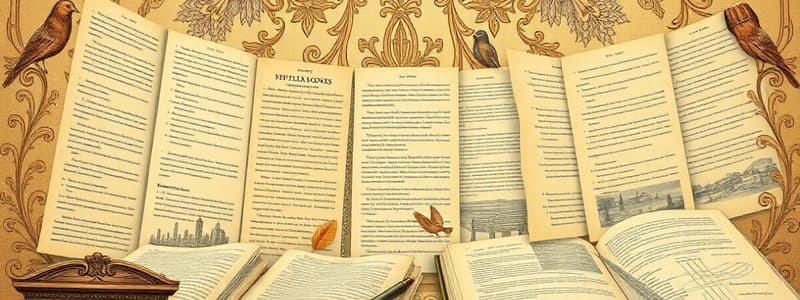Podcast
Questions and Answers
What is the main concept referred to as the social contract?
What is the main concept referred to as the social contract?
According to Locke, what happens when the government abuses its power?
According to Locke, what happens when the government abuses its power?
Which of the following best describes the relationship between limited government and self-governance?
Which of the following best describes the relationship between limited government and self-governance?
What role did the British Parliament play in American self-government?
What role did the British Parliament play in American self-government?
Signup and view all the answers
What were natural rights, according to Locke, and how did they differ from rights granted by the king?
What were natural rights, according to Locke, and how did they differ from rights granted by the king?
Signup and view all the answers
Which philosopher's ideas on natural rights significantly influenced American political thought?
Which philosopher's ideas on natural rights significantly influenced American political thought?
Signup and view all the answers
Which of the following core values influenced the call for independence among American colonies?
Which of the following core values influenced the call for independence among American colonies?
Signup and view all the answers
How did Great Britain's actions contribute to the American Revolution?
How did Great Britain's actions contribute to the American Revolution?
Signup and view all the answers
What condition did Locke specify regarding the use of commons by individuals?
What condition did Locke specify regarding the use of commons by individuals?
Signup and view all the answers
Study Notes
The Pre-Revolutionary Period and the Roots of American Political Tradition
- Core values in American political thought originated in ideas of representational government.
- The American Revolution wasn't caused by sudden new ideas, but by the evolution of existing ones.
- Key figure in colonial political thought was John Locke, a 17th-century English philosopher, whose writings formed the basis for many modern political ideas.
- Locke's significant contributions focused on the relationship between government and natural rights, emphasizing rights to life, liberty, and property.
- Locke wasn't the first to suggest people had rights, as the Magna Carta (1215) already recognized the duty of British government to protect the lives, liberties and property of its citizens.
- English Bill of Rights (1689) further impacted American thought, outlining rights of English Citizens including rights to life, liberty, and property and influencing the U.S. Constitution and Bill of Rights.
- Colonial Americans believed in property rights, influenced by Locke's ideas. They believed in taking from the commons and acquiring property justly as long as it did not deprive others.
- Colonial Americans embraced representative government, an idea reflected in documents like the Mayflower Compact (1620) and the establishment of colonial legislatures.
- Colonists were accustomed to representative self-governance, a practice mirrored in Virginia's House of Burgesses (1619) and the Mayflower Compact (1620).
- The American Revolution was rooted in colonists' growing concerns over British government abuses.
- Colonists initially valued being British citizens and didn't seek independence.
- British actions like the Proclamation of 1763, limiting settlement west of the Appalachians, and imposing direct taxes without colonial consent led to growing resentment.
- Actions like the Stamp Act (1765) and Townshend Acts (1767) fueled colonial opposition to taxation without representation.
- The Boston Massacre (1770), where British soldiers fired upon civilians, was a significant turning point, further enraging colonists.
- The Boston Tea Party (1773) was a dramatic act of defiance against the British East India Company's tea monopoly.
- Intolerable Acts further inflamed colonial resentment, triggering the First Continental Congress.
- In 1775, the Second Continental Congress convened, paving the way for a Declaration of Independence, which was drafted by Thomas Jefferson.
- The Declaration of Independence (1776) argued that government's purpose was to protect the natural rights of individuals—life, liberty, and the pursuit of happiness.
- The Declaration outlined grievances against King George III and the British government, laying the groundwork for American independence, by appealing to common ideals of natural rights and self governance.
Studying That Suits You
Use AI to generate personalized quizzes and flashcards to suit your learning preferences.
Related Documents
Description
Explore the foundational ideas of American political thought that emerged before the Revolution. This quiz delves into key concepts from John Locke and historical documents like the Magna Carta and the English Bill of Rights. Understand how these influences shaped the values of life, liberty, and property rights in the United States.





